
Career Exploration Unit
- Subject:
- Career and Technical Education
- Material Type:
- Lesson
- Author:
- Kim Nolte
- Date Added:
- 07/27/2020

Career Exploration Unit

Career Exploration Unit

Students will begin to explore career fields that they are interested in within the results of their career aptitude test. Students will need to complete the career cluster activity with their results they need to choose an occupation within the field. Once this has been completed students will take a deep dive into that field.
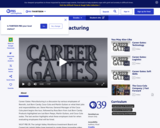
Career Gates: Manufacturing is discussed by various employees of Rexroth, Just Born Candy, Coca-Cola and Martin Guitars. Steve Morrow, General Manager of the Coca-Cola plant begins the tour, followed by Ross Born from Just Born Candy. Products highlighted are Just Born Peeps, Martin Guitars and Coca-Cola sodas. Technologies highlighted are robotics and the use of AutoCad. The last section highlights what these employers look for when evaluating employees that will be hired. ***Access to Teacher's Domain content now requires free login to PBS Learning Media.
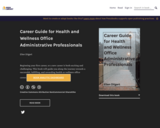
Short Description:
Beginning your first career, or a new career is both exciting and challenging. This book will guide you along the journey towards a successful, fulfilling, and rewarding health or wellness office career.
Long Description:
This book is a road map to help you navigate the job search through practical and logical steps, including the following: Understand and practice professionalism Plan for your career Research today’s labour market Create robust self-marketing tools Build your personal brand Diversify your job search methods Utilize social media to create a professional digital footprint Master your interview skills to stand out from your competition
Word Count: 33297
(Note: This resource's metadata has been created automatically by reformatting and/or combining the information that the author initially provided as part of a bulk import process.)

Success in one’s career depends on much more than just earning good grades in school. Help increase learners’ workforce readiness by building strengths in key interpersonal skills, such as problem solving, leadership, communication, teamwork and collaboration, and critical thinking, using this collection of resources produced by WGBH. The resources can be used to engage learners with media and prompt rich discussion in the classroom and other educational settings.
The collection is currently in development. Browse the initial set of resources—focused on nonverbal communication—and return for new content to be added over time.
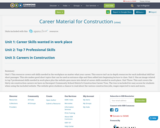
Unit 1: This resource covers soft skills needed in the workplace no matter what your career. This source isn't an in-depth resources for each individual skill but short passages. This site makes good short topics that can be used as entrance slips and then added into beginning lecture to class.
Unit 2: Has an image related to top 7 professional skills needed in work place plus the website goes more into detail of career skills needed in work place.
Unit Three: This unit covers the thirty-six construction careers we have on Davenport Community School District's Construction Career Tree, The tree is included for easy access for students when using the included website. The website gives students a chance to read about the various construction jobs, wages expected to earn and more,
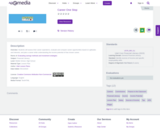
Students will assess their career aspirations, evaluate and compare career opportunities based on aptitudes and interests, and plan a career while understanding the income potential of that chosen career.
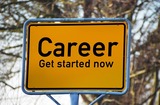
This course introduces students to the career-decision making process and job search strategies that will increase their job readiness, employability, and success in their career. The following four major areas will be covered: (1) Self-Understanding; (2) Creating an attitude of success; (3) Researching jobs and careers; (4) and Job search skills.

This course introduces students to the career-decision making process and job search strategies that will increase their job readiness, employability, and success in their career. The following three major areas will be covered: (1) Self-Understanding; (2) Career Exploration; (3) and Creating a Plan.

This course introduces students to the career-decision making process and job search strategies that will increase their job readiness, employability, and success in their career. The following three major areas will be covered: (1) Self-Understanding; (2) Career Exploration; (3) and Creating a Plan.

This course introduces students to the career-decision making process and job search strategies that will increase their job readiness, employability, and success in their career. The following four major areas will be covered: (1) Self-Understanding; (2) Creating an attitude of success; (3) Researching jobs and careers; (4) and Job search skills.

This course introduces students to the career-decision making process and job search strategies that will increase their job readiness, employability, and success in their career. The following four major areas will be covered: (1) Self-Understanding; (2) Creating an attitude of success; (3) Researching jobs and careers; (4) and Job search skills.

In this lesson, students will be introduced to the grading rubric that will be used for weekly shop or lab grades. In this lesson, students will look at the Nebraska Career Readiness standards, see how they have been modified to fit the shop/lab setting, then brainstorm indicators for each standard. Finally, a PowerPoint will guide students through the rubric will be used. The rubric will be used at the end of each work for students to self evaluate during shop/lab work.
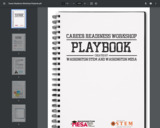
This playbook offers a step-by-step guide for how to hold a successful Career Readiness Workshop targeting middle and high school students, as well as post-secondary students seeking STEM internships and employment. Included are example materials from an event hosted in January 2016 by Washington State MESA as well as templates and presentations for creating your own successful Career Readiness Workshop.

A Career Readiness Workshop is a Career Exploration experience on the continuum of Career Connected Learning. These workshops bring together students and industry professionals to take part in career readiness activities. Students network with professionals, take part in mock interviews, and generally build their confidence and skills related to interactions with potential employers. These events are a great way to help prepare students for meaningful and effective interactions with professionals. Industry professionals with an interest in supporting the talent pipeline and increasing the number of highly qualified young people in their local community also benefit greatly from a Career Readiness Workshop. At a typical Career Readiness Workshop -- which often includes dinner and networking-- industry representatives lead students through three interactive workshops over a three-hour period: Delivering an Elevator Pitch, Resume Best Practices, and Interview Strategies. This helps students develop a skill set to market the STEM skills they’ve attained through their studies. The event also gives opportunities for students and professionals to informally interact and network during dinner and after the workshops.
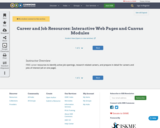
FREE career resources to identify active job openings, research related careers, and prepare in detail for careers and jobs of interest (all on one page).
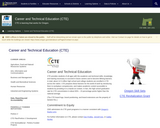
Oregon Department of Education CTE home page.
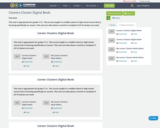
This unit is appropriate for grades 7-12. This can be taught in a middle school or high school course that is focusing specifically on careers. This unit can take about a month to complete if all 16 clusters are used.
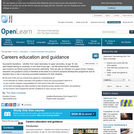
Successful transitions - whether from lower secondary to upper secondary; at age 16; into work-based training or university; or into work at any age - are life-enhancing for individuals and crucial to our future social and economic well-being. They are also an indicator of a good school. Careers education and guidance (CEG) is therefore at the heart of a school's personal development program and all teachers have a role in securing successful transitions for their students.